CHCAGE005 - Dementia Support: Independence, Identity & Well-being
VerifiedAdded on 2023/06/18
|18
|3995
|465
Homework Assignment
AI Summary
This assignment solution for CHCAGE005 focuses on providing support to people living with dementia, addressing the societal devaluation, abuse, and neglect they often face. It emphasizes strategies to help individuals with dementia maintain their independence within their own homes through the use of equipment and assistive technology, promoting their ability to perform day-to-day activities with necessary assistance, and supporting the maintenance of their personal identity. The document also includes essential guidelines on assessment requirements, academic integrity, and student responsibilities, ensuring a comprehensive understanding of the course expectations and ethical conduct.
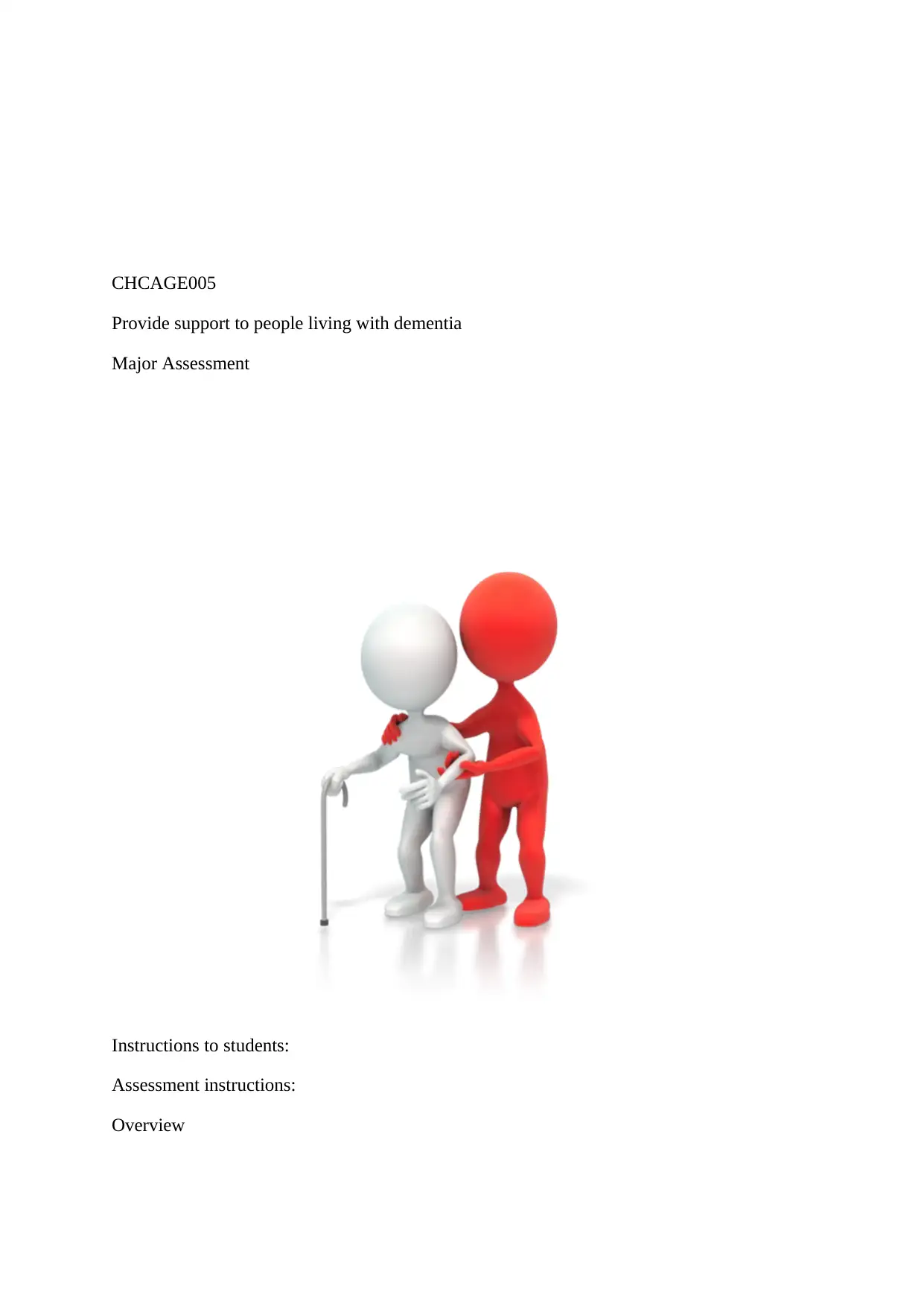
CHCAGE005
Provide support to people living with dementia
Major Assessment
Instructions to students:
Assessment instructions:
Overview
Provide support to people living with dementia
Major Assessment
Instructions to students:
Assessment instructions:
Overview
Paraphrase This Document
Need a fresh take? Get an instant paraphrase of this document with our AI Paraphraser
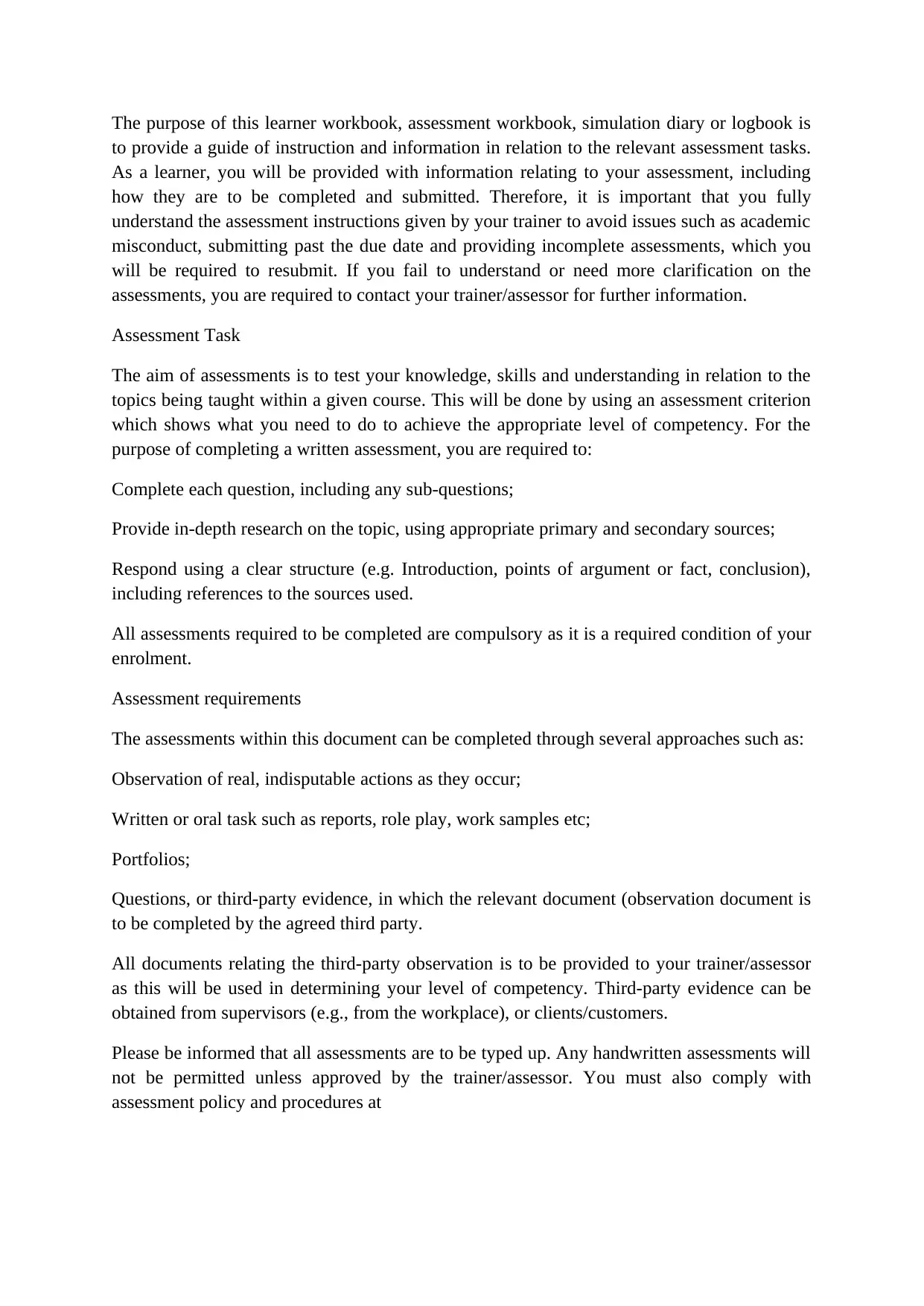
The purpose of this learner workbook, assessment workbook, simulation diary or logbook is
to provide a guide of instruction and information in relation to the relevant assessment tasks.
As a learner, you will be provided with information relating to your assessment, including
how they are to be completed and submitted. Therefore, it is important that you fully
understand the assessment instructions given by your trainer to avoid issues such as academic
misconduct, submitting past the due date and providing incomplete assessments, which you
will be required to resubmit. If you fail to understand or need more clarification on the
assessments, you are required to contact your trainer/assessor for further information.
Assessment Task
The aim of assessments is to test your knowledge, skills and understanding in relation to the
topics being taught within a given course. This will be done by using an assessment criterion
which shows what you need to do to achieve the appropriate level of competency. For the
purpose of completing a written assessment, you are required to:
Complete each question, including any sub-questions;
Provide in-depth research on the topic, using appropriate primary and secondary sources;
Respond using a clear structure (e.g. Introduction, points of argument or fact, conclusion),
including references to the sources used.
All assessments required to be completed are compulsory as it is a required condition of your
enrolment.
Assessment requirements
The assessments within this document can be completed through several approaches such as:
Observation of real, indisputable actions as they occur;
Written or oral task such as reports, role play, work samples etc;
Portfolios;
Questions, or third-party evidence, in which the relevant document (observation document is
to be completed by the agreed third party.
All documents relating the third-party observation is to be provided to your trainer/assessor
as this will be used in determining your level of competency. Third-party evidence can be
obtained from supervisors (e.g., from the workplace), or clients/customers.
Please be informed that all assessments are to be typed up. Any handwritten assessments will
not be permitted unless approved by the trainer/assessor. You must also comply with
assessment policy and procedures at
to provide a guide of instruction and information in relation to the relevant assessment tasks.
As a learner, you will be provided with information relating to your assessment, including
how they are to be completed and submitted. Therefore, it is important that you fully
understand the assessment instructions given by your trainer to avoid issues such as academic
misconduct, submitting past the due date and providing incomplete assessments, which you
will be required to resubmit. If you fail to understand or need more clarification on the
assessments, you are required to contact your trainer/assessor for further information.
Assessment Task
The aim of assessments is to test your knowledge, skills and understanding in relation to the
topics being taught within a given course. This will be done by using an assessment criterion
which shows what you need to do to achieve the appropriate level of competency. For the
purpose of completing a written assessment, you are required to:
Complete each question, including any sub-questions;
Provide in-depth research on the topic, using appropriate primary and secondary sources;
Respond using a clear structure (e.g. Introduction, points of argument or fact, conclusion),
including references to the sources used.
All assessments required to be completed are compulsory as it is a required condition of your
enrolment.
Assessment requirements
The assessments within this document can be completed through several approaches such as:
Observation of real, indisputable actions as they occur;
Written or oral task such as reports, role play, work samples etc;
Portfolios;
Questions, or third-party evidence, in which the relevant document (observation document is
to be completed by the agreed third party.
All documents relating the third-party observation is to be provided to your trainer/assessor
as this will be used in determining your level of competency. Third-party evidence can be
obtained from supervisors (e.g., from the workplace), or clients/customers.
Please be informed that all assessments are to be typed up. Any handwritten assessments will
not be permitted unless approved by the trainer/assessor. You must also comply with
assessment policy and procedures at
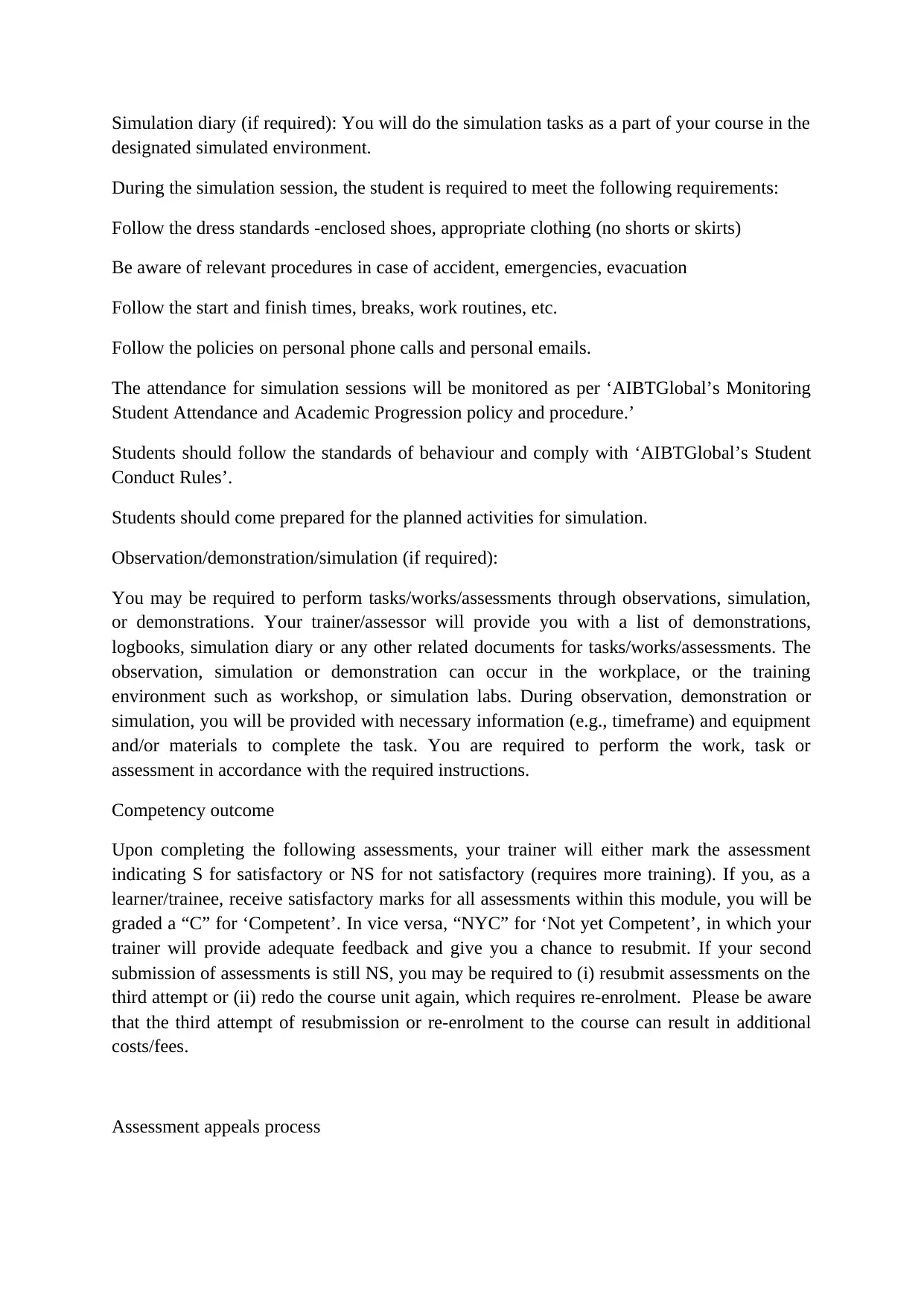
Simulation diary (if required): You will do the simulation tasks as a part of your course in the
designated simulated environment.
During the simulation session, the student is required to meet the following requirements:
Follow the dress standards -enclosed shoes, appropriate clothing (no shorts or skirts)
Be aware of relevant procedures in case of accident, emergencies, evacuation
Follow the start and finish times, breaks, work routines, etc.
Follow the policies on personal phone calls and personal emails.
The attendance for simulation sessions will be monitored as per ‘AIBTGlobal’s Monitoring
Student Attendance and Academic Progression policy and procedure.’
Students should follow the standards of behaviour and comply with ‘AIBTGlobal’s Student
Conduct Rules’.
Students should come prepared for the planned activities for simulation.
Observation/demonstration/simulation (if required):
You may be required to perform tasks/works/assessments through observations, simulation,
or demonstrations. Your trainer/assessor will provide you with a list of demonstrations,
logbooks, simulation diary or any other related documents for tasks/works/assessments. The
observation, simulation or demonstration can occur in the workplace, or the training
environment such as workshop, or simulation labs. During observation, demonstration or
simulation, you will be provided with necessary information (e.g., timeframe) and equipment
and/or materials to complete the task. You are required to perform the work, task or
assessment in accordance with the required instructions.
Competency outcome
Upon completing the following assessments, your trainer will either mark the assessment
indicating S for satisfactory or NS for not satisfactory (requires more training). If you, as a
learner/trainee, receive satisfactory marks for all assessments within this module, you will be
graded a “C” for ‘Competent’. In vice versa, “NYC” for ‘Not yet Competent’, in which your
trainer will provide adequate feedback and give you a chance to resubmit. If your second
submission of assessments is still NS, you may be required to (i) resubmit assessments on the
third attempt or (ii) redo the course unit again, which requires re-enrolment. Please be aware
that the third attempt of resubmission or re-enrolment to the course can result in additional
costs/fees.
Assessment appeals process
designated simulated environment.
During the simulation session, the student is required to meet the following requirements:
Follow the dress standards -enclosed shoes, appropriate clothing (no shorts or skirts)
Be aware of relevant procedures in case of accident, emergencies, evacuation
Follow the start and finish times, breaks, work routines, etc.
Follow the policies on personal phone calls and personal emails.
The attendance for simulation sessions will be monitored as per ‘AIBTGlobal’s Monitoring
Student Attendance and Academic Progression policy and procedure.’
Students should follow the standards of behaviour and comply with ‘AIBTGlobal’s Student
Conduct Rules’.
Students should come prepared for the planned activities for simulation.
Observation/demonstration/simulation (if required):
You may be required to perform tasks/works/assessments through observations, simulation,
or demonstrations. Your trainer/assessor will provide you with a list of demonstrations,
logbooks, simulation diary or any other related documents for tasks/works/assessments. The
observation, simulation or demonstration can occur in the workplace, or the training
environment such as workshop, or simulation labs. During observation, demonstration or
simulation, you will be provided with necessary information (e.g., timeframe) and equipment
and/or materials to complete the task. You are required to perform the work, task or
assessment in accordance with the required instructions.
Competency outcome
Upon completing the following assessments, your trainer will either mark the assessment
indicating S for satisfactory or NS for not satisfactory (requires more training). If you, as a
learner/trainee, receive satisfactory marks for all assessments within this module, you will be
graded a “C” for ‘Competent’. In vice versa, “NYC” for ‘Not yet Competent’, in which your
trainer will provide adequate feedback and give you a chance to resubmit. If your second
submission of assessments is still NS, you may be required to (i) resubmit assessments on the
third attempt or (ii) redo the course unit again, which requires re-enrolment. Please be aware
that the third attempt of resubmission or re-enrolment to the course can result in additional
costs/fees.
Assessment appeals process
⊘ This is a preview!⊘
Do you want full access?
Subscribe today to unlock all pages.

Trusted by 1+ million students worldwide
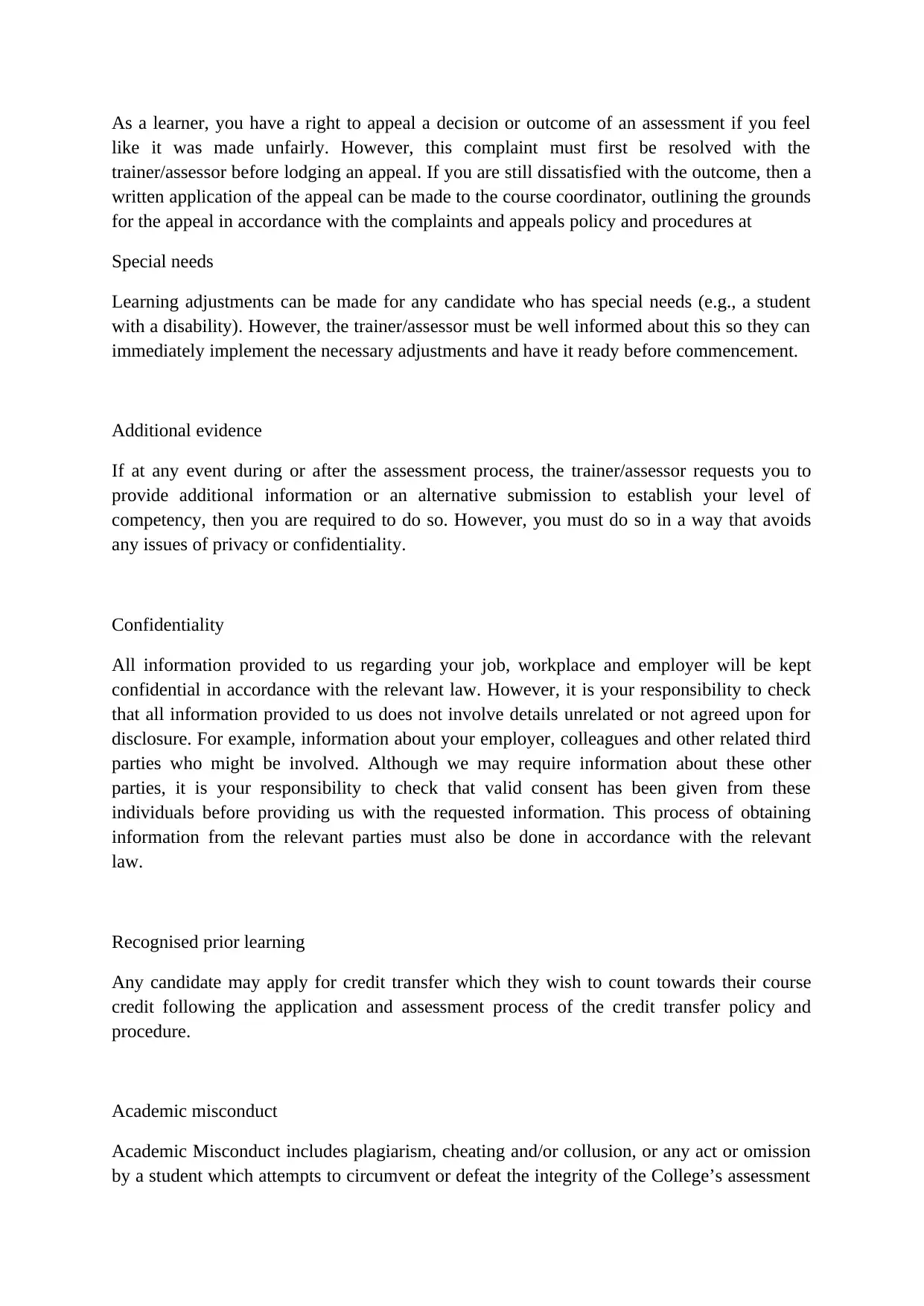
As a learner, you have a right to appeal a decision or outcome of an assessment if you feel
like it was made unfairly. However, this complaint must first be resolved with the
trainer/assessor before lodging an appeal. If you are still dissatisfied with the outcome, then a
written application of the appeal can be made to the course coordinator, outlining the grounds
for the appeal in accordance with the complaints and appeals policy and procedures at
Special needs
Learning adjustments can be made for any candidate who has special needs (e.g., a student
with a disability). However, the trainer/assessor must be well informed about this so they can
immediately implement the necessary adjustments and have it ready before commencement.
Additional evidence
If at any event during or after the assessment process, the trainer/assessor requests you to
provide additional information or an alternative submission to establish your level of
competency, then you are required to do so. However, you must do so in a way that avoids
any issues of privacy or confidentiality.
Confidentiality
All information provided to us regarding your job, workplace and employer will be kept
confidential in accordance with the relevant law. However, it is your responsibility to check
that all information provided to us does not involve details unrelated or not agreed upon for
disclosure. For example, information about your employer, colleagues and other related third
parties who might be involved. Although we may require information about these other
parties, it is your responsibility to check that valid consent has been given from these
individuals before providing us with the requested information. This process of obtaining
information from the relevant parties must also be done in accordance with the relevant
law.
Recognised prior learning
Any candidate may apply for credit transfer which they wish to count towards their course
credit following the application and assessment process of the credit transfer policy and
procedure.
Academic misconduct
Academic Misconduct includes plagiarism, cheating and/or collusion, or any act or omission
by a student which attempts to circumvent or defeat the integrity of the College’s assessment
like it was made unfairly. However, this complaint must first be resolved with the
trainer/assessor before lodging an appeal. If you are still dissatisfied with the outcome, then a
written application of the appeal can be made to the course coordinator, outlining the grounds
for the appeal in accordance with the complaints and appeals policy and procedures at
Special needs
Learning adjustments can be made for any candidate who has special needs (e.g., a student
with a disability). However, the trainer/assessor must be well informed about this so they can
immediately implement the necessary adjustments and have it ready before commencement.
Additional evidence
If at any event during or after the assessment process, the trainer/assessor requests you to
provide additional information or an alternative submission to establish your level of
competency, then you are required to do so. However, you must do so in a way that avoids
any issues of privacy or confidentiality.
Confidentiality
All information provided to us regarding your job, workplace and employer will be kept
confidential in accordance with the relevant law. However, it is your responsibility to check
that all information provided to us does not involve details unrelated or not agreed upon for
disclosure. For example, information about your employer, colleagues and other related third
parties who might be involved. Although we may require information about these other
parties, it is your responsibility to check that valid consent has been given from these
individuals before providing us with the requested information. This process of obtaining
information from the relevant parties must also be done in accordance with the relevant
law.
Recognised prior learning
Any candidate may apply for credit transfer which they wish to count towards their course
credit following the application and assessment process of the credit transfer policy and
procedure.
Academic misconduct
Academic Misconduct includes plagiarism, cheating and/or collusion, or any act or omission
by a student which attempts to circumvent or defeat the integrity of the College’s assessment
Paraphrase This Document
Need a fresh take? Get an instant paraphrase of this document with our AI Paraphraser
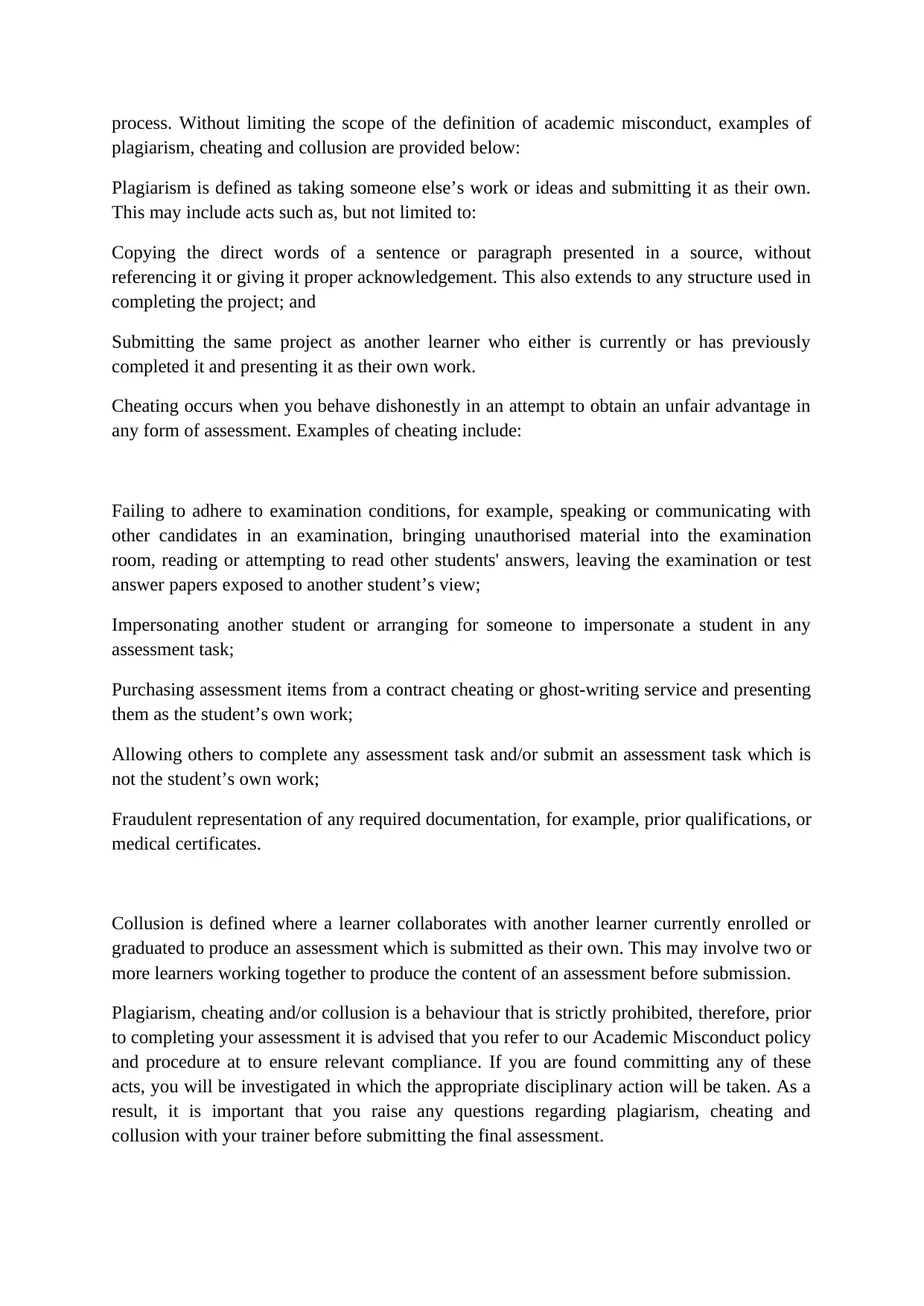
process. Without limiting the scope of the definition of academic misconduct, examples of
plagiarism, cheating and collusion are provided below:
Plagiarism is defined as taking someone else’s work or ideas and submitting it as their own.
This may include acts such as, but not limited to:
Copying the direct words of a sentence or paragraph presented in a source, without
referencing it or giving it proper acknowledgement. This also extends to any structure used in
completing the project; and
Submitting the same project as another learner who either is currently or has previously
completed it and presenting it as their own work.
Cheating occurs when you behave dishonestly in an attempt to obtain an unfair advantage in
any form of assessment. Examples of cheating include:
Failing to adhere to examination conditions, for example, speaking or communicating with
other candidates in an examination, bringing unauthorised material into the examination
room, reading or attempting to read other students' answers, leaving the examination or test
answer papers exposed to another student’s view;
Impersonating another student or arranging for someone to impersonate a student in any
assessment task;
Purchasing assessment items from a contract cheating or ghost-writing service and presenting
them as the student’s own work;
Allowing others to complete any assessment task and/or submit an assessment task which is
not the student’s own work;
Fraudulent representation of any required documentation, for example, prior qualifications, or
medical certificates.
Collusion is defined where a learner collaborates with another learner currently enrolled or
graduated to produce an assessment which is submitted as their own. This may involve two or
more learners working together to produce the content of an assessment before submission.
Plagiarism, cheating and/or collusion is a behaviour that is strictly prohibited, therefore, prior
to completing your assessment it is advised that you refer to our Academic Misconduct policy
and procedure at to ensure relevant compliance. If you are found committing any of these
acts, you will be investigated in which the appropriate disciplinary action will be taken. As a
result, it is important that you raise any questions regarding plagiarism, cheating and
collusion with your trainer before submitting the final assessment.
plagiarism, cheating and collusion are provided below:
Plagiarism is defined as taking someone else’s work or ideas and submitting it as their own.
This may include acts such as, but not limited to:
Copying the direct words of a sentence or paragraph presented in a source, without
referencing it or giving it proper acknowledgement. This also extends to any structure used in
completing the project; and
Submitting the same project as another learner who either is currently or has previously
completed it and presenting it as their own work.
Cheating occurs when you behave dishonestly in an attempt to obtain an unfair advantage in
any form of assessment. Examples of cheating include:
Failing to adhere to examination conditions, for example, speaking or communicating with
other candidates in an examination, bringing unauthorised material into the examination
room, reading or attempting to read other students' answers, leaving the examination or test
answer papers exposed to another student’s view;
Impersonating another student or arranging for someone to impersonate a student in any
assessment task;
Purchasing assessment items from a contract cheating or ghost-writing service and presenting
them as the student’s own work;
Allowing others to complete any assessment task and/or submit an assessment task which is
not the student’s own work;
Fraudulent representation of any required documentation, for example, prior qualifications, or
medical certificates.
Collusion is defined where a learner collaborates with another learner currently enrolled or
graduated to produce an assessment which is submitted as their own. This may involve two or
more learners working together to produce the content of an assessment before submission.
Plagiarism, cheating and/or collusion is a behaviour that is strictly prohibited, therefore, prior
to completing your assessment it is advised that you refer to our Academic Misconduct policy
and procedure at to ensure relevant compliance. If you are found committing any of these
acts, you will be investigated in which the appropriate disciplinary action will be taken. As a
result, it is important that you raise any questions regarding plagiarism, cheating and
collusion with your trainer before submitting the final assessment.
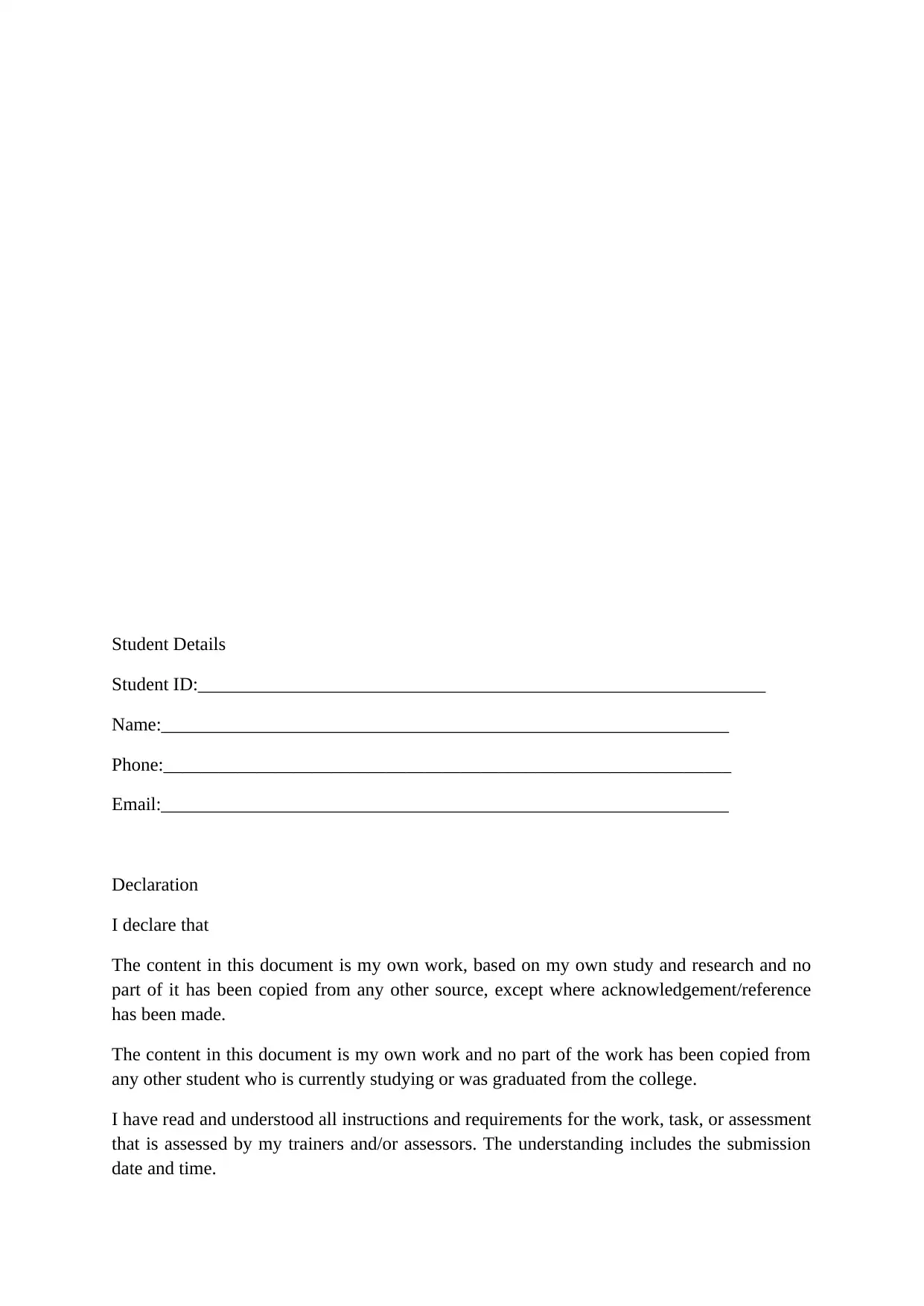
Student Details
Student ID:_____________________________________________________________
Name:_____________________________________________________________
Phone:_____________________________________________________________
Email:_____________________________________________________________
Declaration
I declare that
The content in this document is my own work, based on my own study and research and no
part of it has been copied from any other source, except where acknowledgement/reference
has been made.
The content in this document is my own work and no part of the work has been copied from
any other student who is currently studying or was graduated from the college.
I have read and understood all instructions and requirements for the work, task, or assessment
that is assessed by my trainers and/or assessors. The understanding includes the submission
date and time.
Student ID:_____________________________________________________________
Name:_____________________________________________________________
Phone:_____________________________________________________________
Email:_____________________________________________________________
Declaration
I declare that
The content in this document is my own work, based on my own study and research and no
part of it has been copied from any other source, except where acknowledgement/reference
has been made.
The content in this document is my own work and no part of the work has been copied from
any other student who is currently studying or was graduated from the college.
I have read and understood all instructions and requirements for the work, task, or assessment
that is assessed by my trainers and/or assessors. The understanding includes the submission
date and time.
⊘ This is a preview!⊘
Do you want full access?
Subscribe today to unlock all pages.

Trusted by 1+ million students worldwide
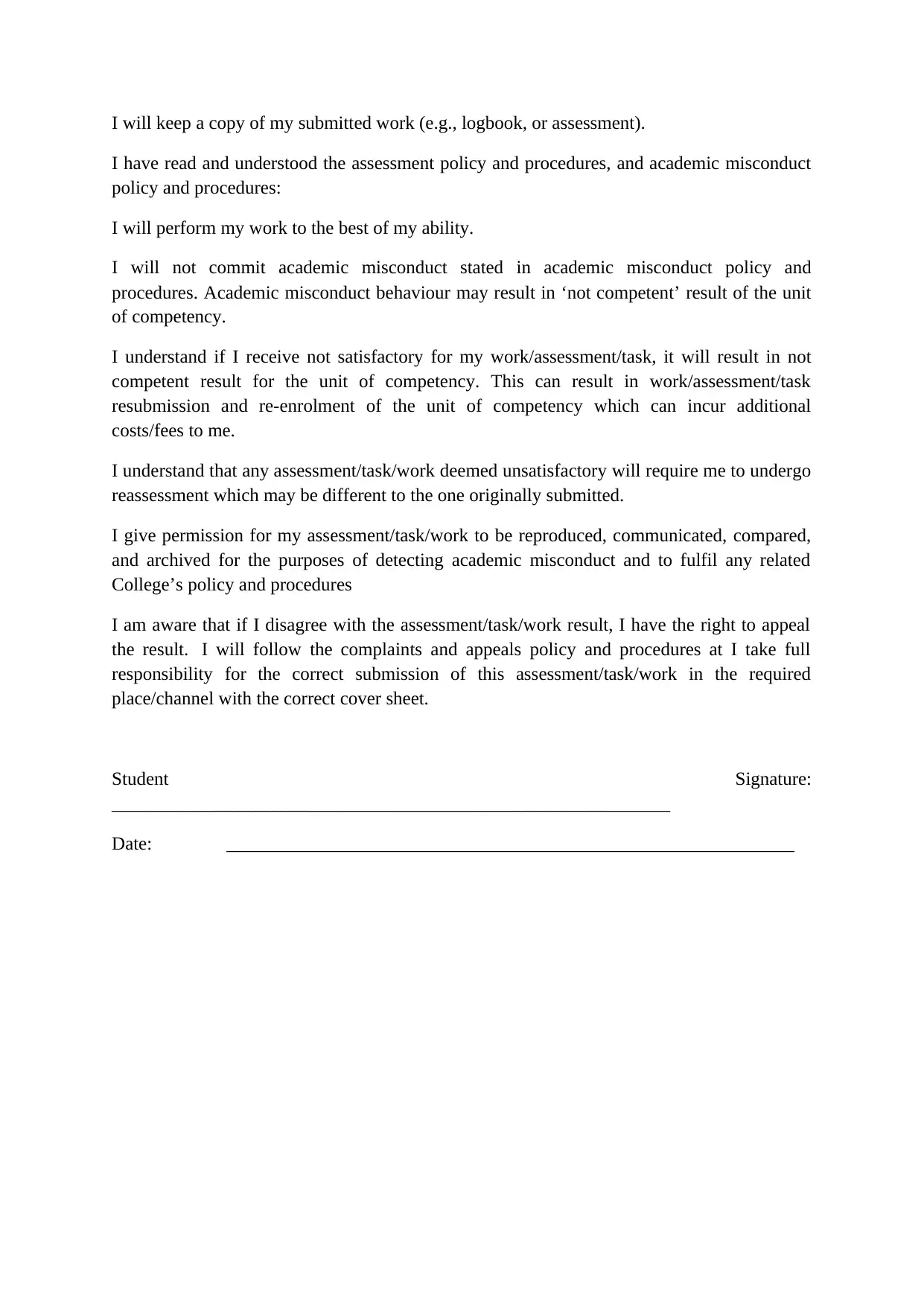
I will keep a copy of my submitted work (e.g., logbook, or assessment).
I have read and understood the assessment policy and procedures, and academic misconduct
policy and procedures:
I will perform my work to the best of my ability.
I will not commit academic misconduct stated in academic misconduct policy and
procedures. Academic misconduct behaviour may result in ‘not competent’ result of the unit
of competency.
I understand if I receive not satisfactory for my work/assessment/task, it will result in not
competent result for the unit of competency. This can result in work/assessment/task
resubmission and re-enrolment of the unit of competency which can incur additional
costs/fees to me.
I understand that any assessment/task/work deemed unsatisfactory will require me to undergo
reassessment which may be different to the one originally submitted.
I give permission for my assessment/task/work to be reproduced, communicated, compared,
and archived for the purposes of detecting academic misconduct and to fulfil any related
College’s policy and procedures
I am aware that if I disagree with the assessment/task/work result, I have the right to appeal
the result. I will follow the complaints and appeals policy and procedures at I take full
responsibility for the correct submission of this assessment/task/work in the required
place/channel with the correct cover sheet.
Student Signature:
____________________________________________________________
Date: _____________________________________________________________
I have read and understood the assessment policy and procedures, and academic misconduct
policy and procedures:
I will perform my work to the best of my ability.
I will not commit academic misconduct stated in academic misconduct policy and
procedures. Academic misconduct behaviour may result in ‘not competent’ result of the unit
of competency.
I understand if I receive not satisfactory for my work/assessment/task, it will result in not
competent result for the unit of competency. This can result in work/assessment/task
resubmission and re-enrolment of the unit of competency which can incur additional
costs/fees to me.
I understand that any assessment/task/work deemed unsatisfactory will require me to undergo
reassessment which may be different to the one originally submitted.
I give permission for my assessment/task/work to be reproduced, communicated, compared,
and archived for the purposes of detecting academic misconduct and to fulfil any related
College’s policy and procedures
I am aware that if I disagree with the assessment/task/work result, I have the right to appeal
the result. I will follow the complaints and appeals policy and procedures at I take full
responsibility for the correct submission of this assessment/task/work in the required
place/channel with the correct cover sheet.
Student Signature:
____________________________________________________________
Date: _____________________________________________________________
Paraphrase This Document
Need a fresh take? Get an instant paraphrase of this document with our AI Paraphraser
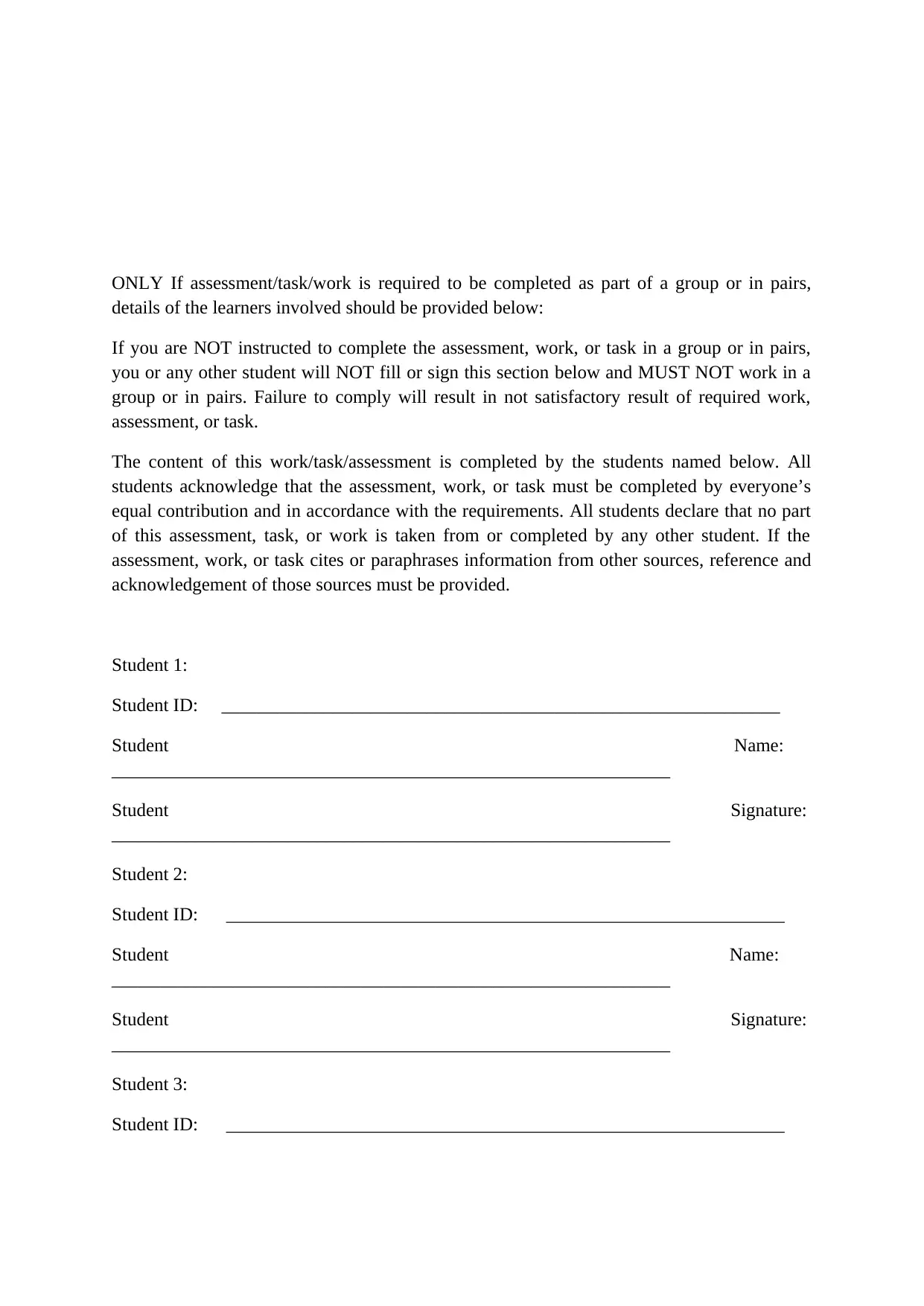
ONLY If assessment/task/work is required to be completed as part of a group or in pairs,
details of the learners involved should be provided below:
If you are NOT instructed to complete the assessment, work, or task in a group or in pairs,
you or any other student will NOT fill or sign this section below and MUST NOT work in a
group or in pairs. Failure to comply will result in not satisfactory result of required work,
assessment, or task.
The content of this work/task/assessment is completed by the students named below. All
students acknowledge that the assessment, work, or task must be completed by everyone’s
equal contribution and in accordance with the requirements. All students declare that no part
of this assessment, task, or work is taken from or completed by any other student. If the
assessment, work, or task cites or paraphrases information from other sources, reference and
acknowledgement of those sources must be provided.
Student 1:
Student ID: ____________________________________________________________
Student Name:
____________________________________________________________
Student Signature:
____________________________________________________________
Student 2:
Student ID: ____________________________________________________________
Student Name:
____________________________________________________________
Student Signature:
____________________________________________________________
Student 3:
Student ID: ____________________________________________________________
details of the learners involved should be provided below:
If you are NOT instructed to complete the assessment, work, or task in a group or in pairs,
you or any other student will NOT fill or sign this section below and MUST NOT work in a
group or in pairs. Failure to comply will result in not satisfactory result of required work,
assessment, or task.
The content of this work/task/assessment is completed by the students named below. All
students acknowledge that the assessment, work, or task must be completed by everyone’s
equal contribution and in accordance with the requirements. All students declare that no part
of this assessment, task, or work is taken from or completed by any other student. If the
assessment, work, or task cites or paraphrases information from other sources, reference and
acknowledgement of those sources must be provided.
Student 1:
Student ID: ____________________________________________________________
Student Name:
____________________________________________________________
Student Signature:
____________________________________________________________
Student 2:
Student ID: ____________________________________________________________
Student Name:
____________________________________________________________
Student Signature:
____________________________________________________________
Student 3:
Student ID: ____________________________________________________________
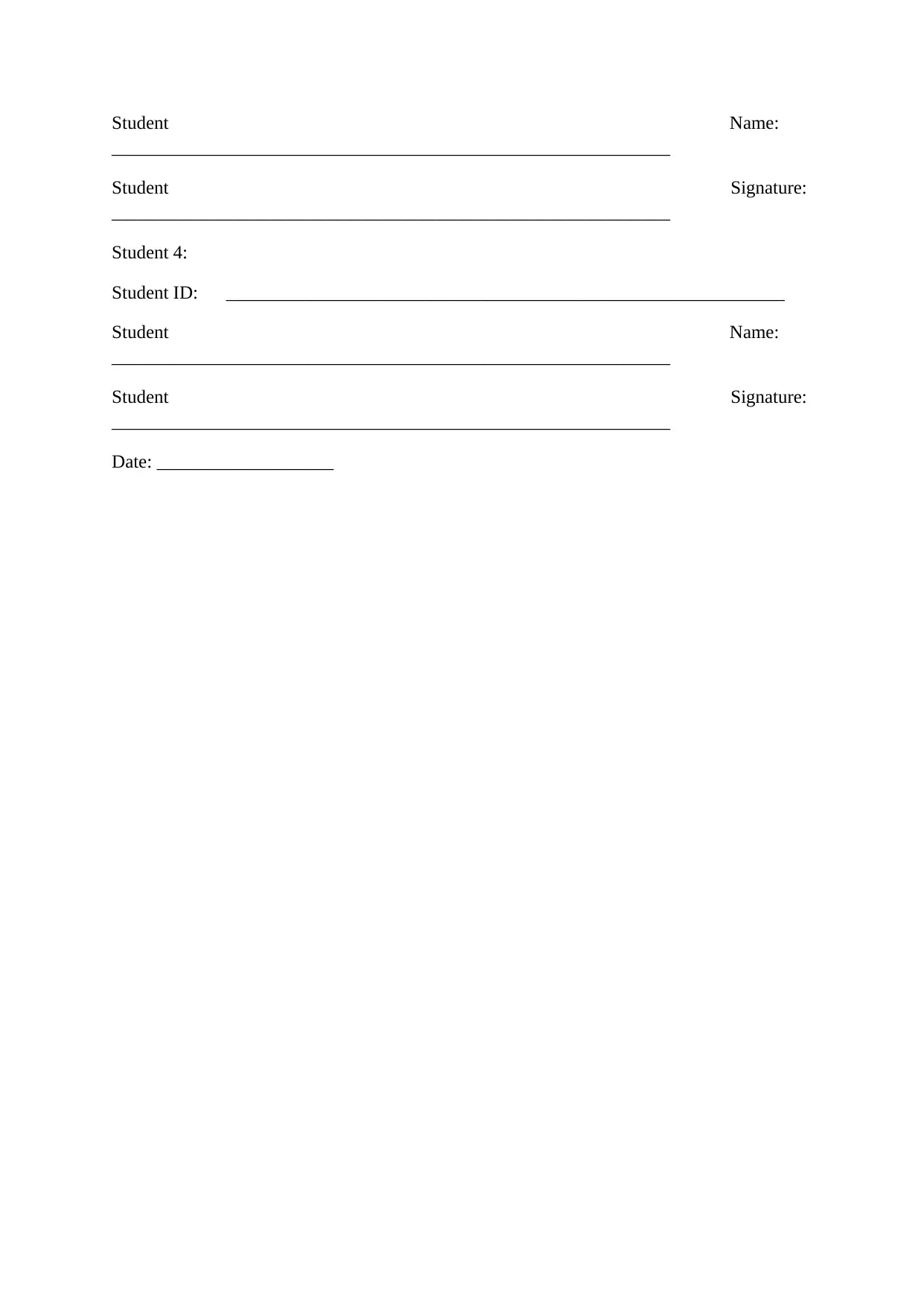
Student Name:
____________________________________________________________
Student Signature:
____________________________________________________________
Student 4:
Student ID: ____________________________________________________________
Student Name:
____________________________________________________________
Student Signature:
____________________________________________________________
Date: ___________________
____________________________________________________________
Student Signature:
____________________________________________________________
Student 4:
Student ID: ____________________________________________________________
Student Name:
____________________________________________________________
Student Signature:
____________________________________________________________
Date: ___________________
⊘ This is a preview!⊘
Do you want full access?
Subscribe today to unlock all pages.

Trusted by 1+ million students worldwide
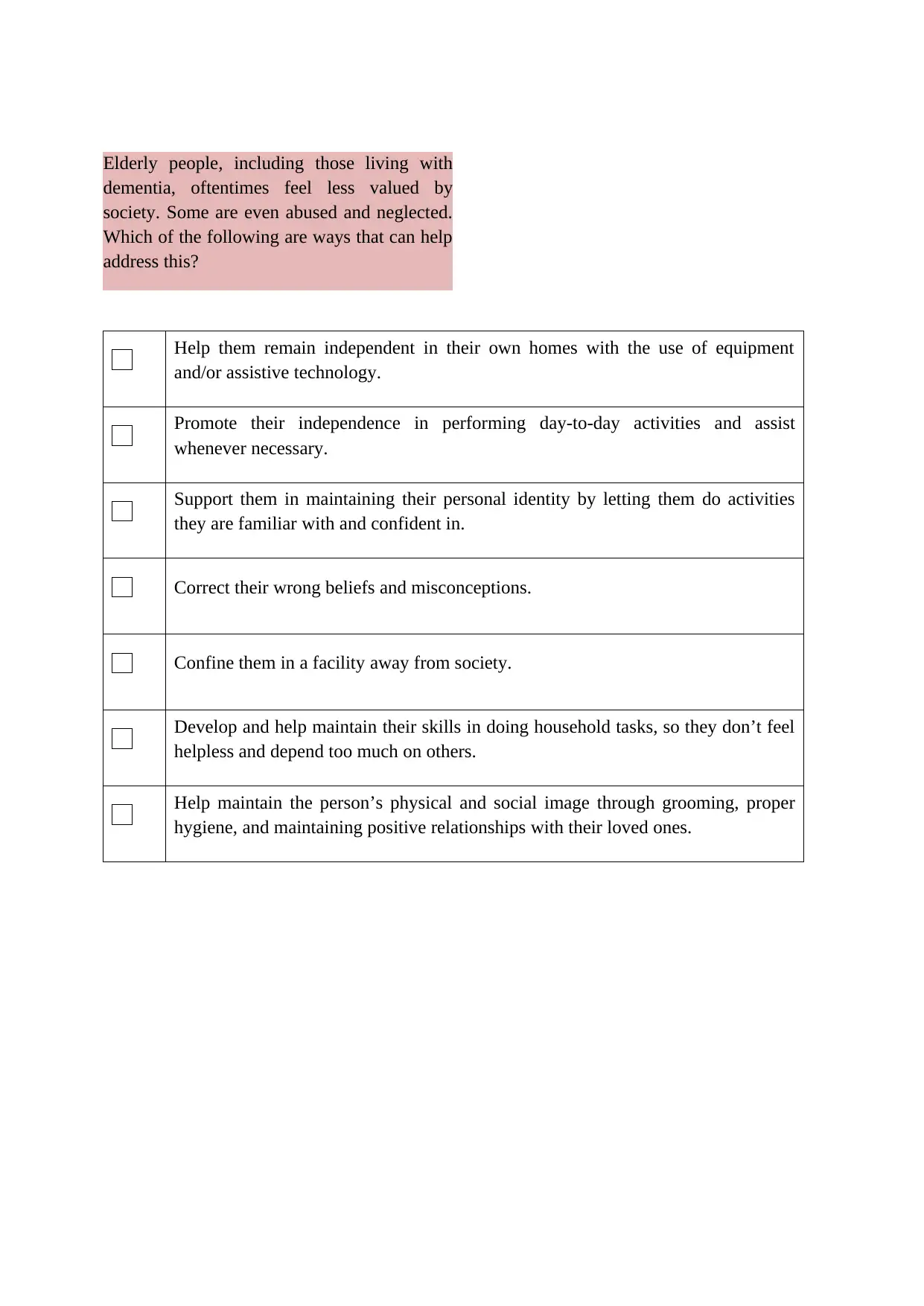
Elderly people, including those living with
dementia, oftentimes feel less valued by
society. Some are even abused and neglected.
Which of the following are ways that can help
address this?
Help them remain independent in their own homes with the use of equipment
and/or assistive technology.
Promote their independence in performing day-to-day activities and assist
whenever necessary.
Support them in maintaining their personal identity by letting them do activities
they are familiar with and confident in.
Correct their wrong beliefs and misconceptions.
Confine them in a facility away from society.
Develop and help maintain their skills in doing household tasks, so they don’t feel
helpless and depend too much on others.
Help maintain the person’s physical and social image through grooming, proper
hygiene, and maintaining positive relationships with their loved ones.
dementia, oftentimes feel less valued by
society. Some are even abused and neglected.
Which of the following are ways that can help
address this?
Help them remain independent in their own homes with the use of equipment
and/or assistive technology.
Promote their independence in performing day-to-day activities and assist
whenever necessary.
Support them in maintaining their personal identity by letting them do activities
they are familiar with and confident in.
Correct their wrong beliefs and misconceptions.
Confine them in a facility away from society.
Develop and help maintain their skills in doing household tasks, so they don’t feel
helpless and depend too much on others.
Help maintain the person’s physical and social image through grooming, proper
hygiene, and maintaining positive relationships with their loved ones.
Paraphrase This Document
Need a fresh take? Get an instant paraphrase of this document with our AI Paraphraser
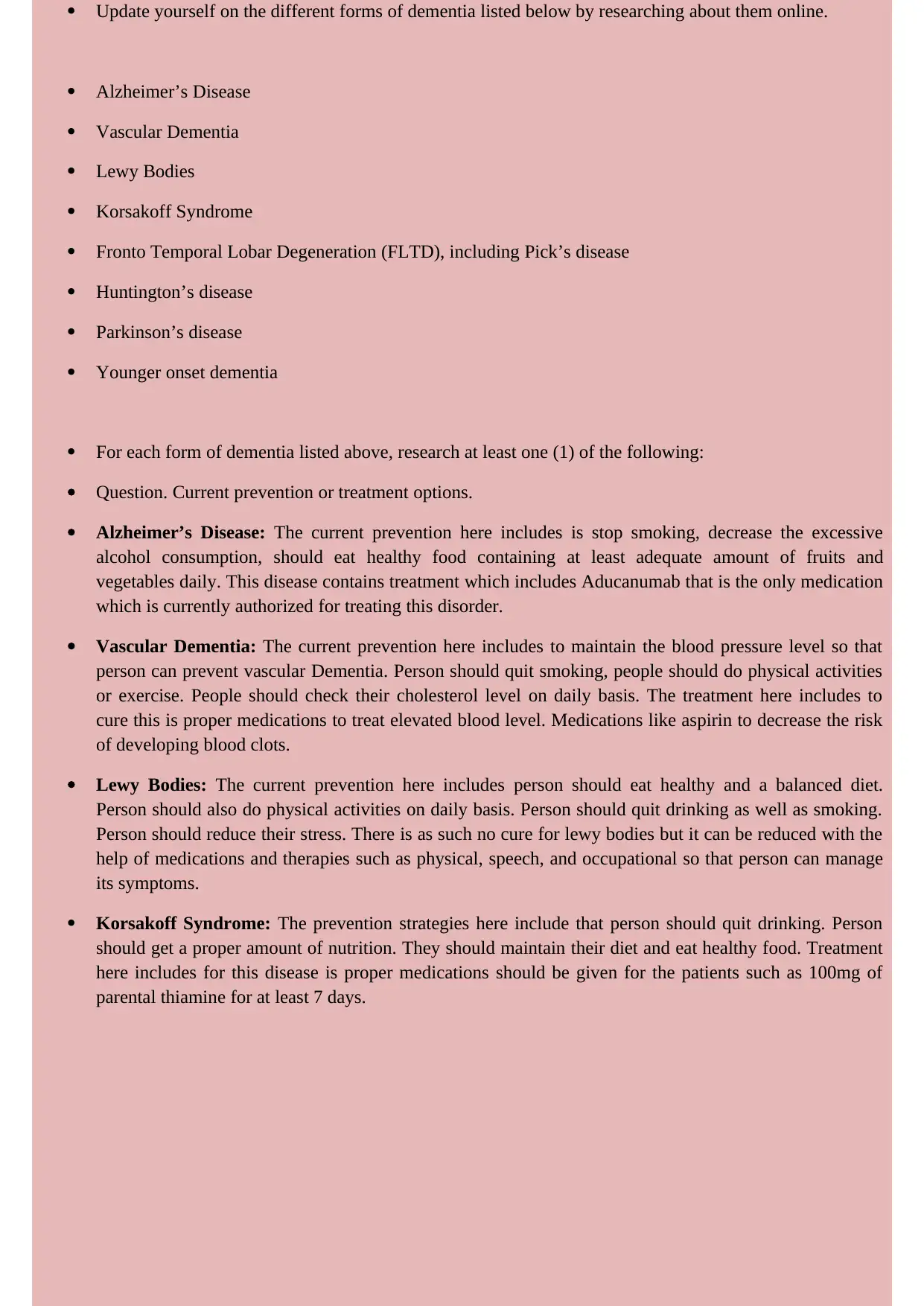
Update yourself on the different forms of dementia listed below by researching about them online.
Alzheimer’s Disease
Vascular Dementia
Lewy Bodies
Korsakoff Syndrome
Fronto Temporal Lobar Degeneration (FLTD), including Pick’s disease
Huntington’s disease
Parkinson’s disease
Younger onset dementia
For each form of dementia listed above, research at least one (1) of the following:
Question. Current prevention or treatment options.
Alzheimer’s Disease: The current prevention here includes is stop smoking, decrease the excessive
alcohol consumption, should eat healthy food containing at least adequate amount of fruits and
vegetables daily. This disease contains treatment which includes Aducanumab that is the only medication
which is currently authorized for treating this disorder.
Vascular Dementia: The current prevention here includes to maintain the blood pressure level so that
person can prevent vascular Dementia. Person should quit smoking, people should do physical activities
or exercise. People should check their cholesterol level on daily basis. The treatment here includes to
cure this is proper medications to treat elevated blood level. Medications like aspirin to decrease the risk
of developing blood clots.
Lewy Bodies: The current prevention here includes person should eat healthy and a balanced diet.
Person should also do physical activities on daily basis. Person should quit drinking as well as smoking.
Person should reduce their stress. There is as such no cure for lewy bodies but it can be reduced with the
help of medications and therapies such as physical, speech, and occupational so that person can manage
its symptoms.
Korsakoff Syndrome: The prevention strategies here include that person should quit drinking. Person
should get a proper amount of nutrition. They should maintain their diet and eat healthy food. Treatment
here includes for this disease is proper medications should be given for the patients such as 100mg of
parental thiamine for at least 7 days.
Alzheimer’s Disease
Vascular Dementia
Lewy Bodies
Korsakoff Syndrome
Fronto Temporal Lobar Degeneration (FLTD), including Pick’s disease
Huntington’s disease
Parkinson’s disease
Younger onset dementia
For each form of dementia listed above, research at least one (1) of the following:
Question. Current prevention or treatment options.
Alzheimer’s Disease: The current prevention here includes is stop smoking, decrease the excessive
alcohol consumption, should eat healthy food containing at least adequate amount of fruits and
vegetables daily. This disease contains treatment which includes Aducanumab that is the only medication
which is currently authorized for treating this disorder.
Vascular Dementia: The current prevention here includes to maintain the blood pressure level so that
person can prevent vascular Dementia. Person should quit smoking, people should do physical activities
or exercise. People should check their cholesterol level on daily basis. The treatment here includes to
cure this is proper medications to treat elevated blood level. Medications like aspirin to decrease the risk
of developing blood clots.
Lewy Bodies: The current prevention here includes person should eat healthy and a balanced diet.
Person should also do physical activities on daily basis. Person should quit drinking as well as smoking.
Person should reduce their stress. There is as such no cure for lewy bodies but it can be reduced with the
help of medications and therapies such as physical, speech, and occupational so that person can manage
its symptoms.
Korsakoff Syndrome: The prevention strategies here include that person should quit drinking. Person
should get a proper amount of nutrition. They should maintain their diet and eat healthy food. Treatment
here includes for this disease is proper medications should be given for the patients such as 100mg of
parental thiamine for at least 7 days.
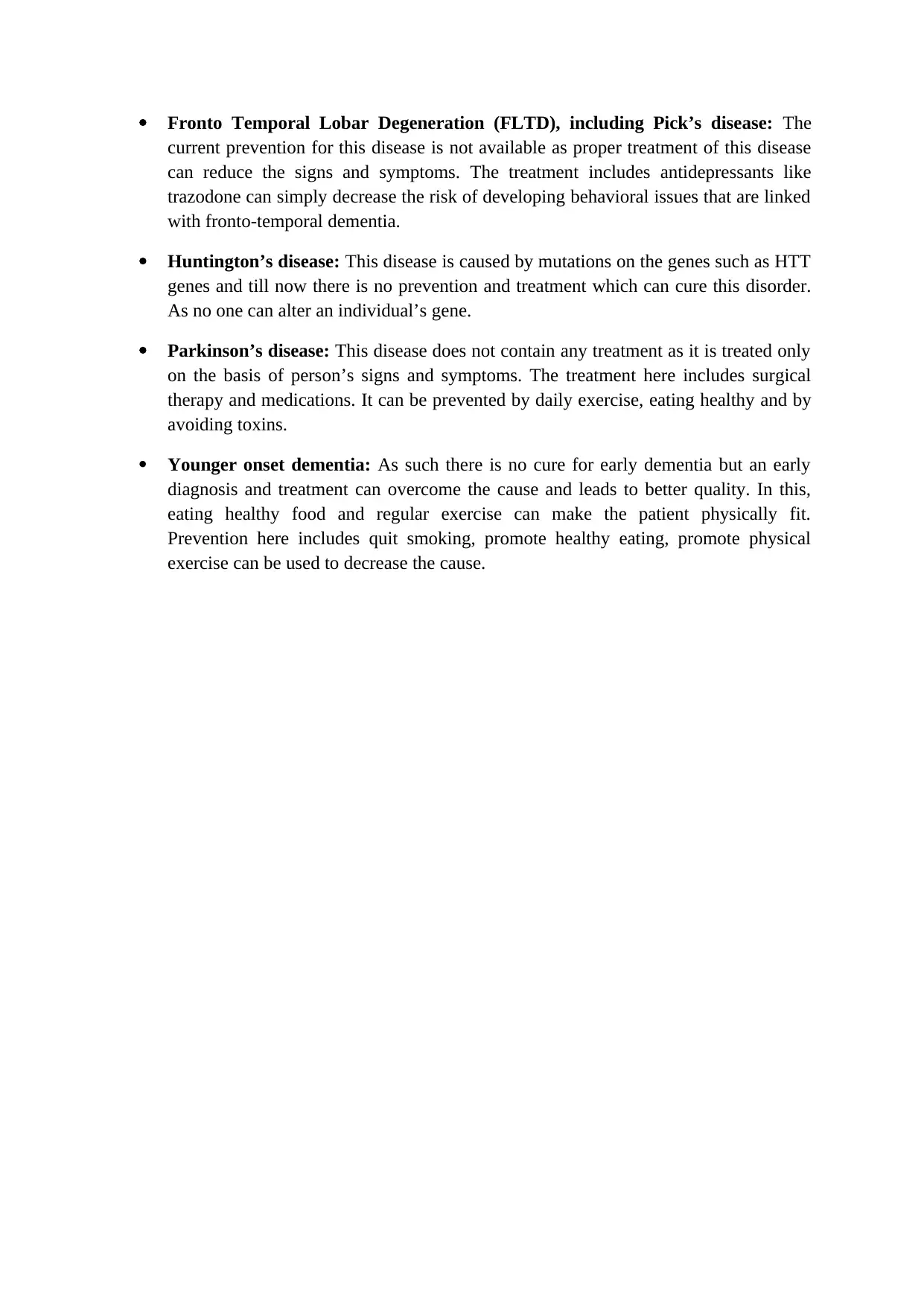
Fronto Temporal Lobar Degeneration (FLTD), including Pick’s disease: The
current prevention for this disease is not available as proper treatment of this disease
can reduce the signs and symptoms. The treatment includes antidepressants like
trazodone can simply decrease the risk of developing behavioral issues that are linked
with fronto-temporal dementia.
Huntington’s disease: This disease is caused by mutations on the genes such as HTT
genes and till now there is no prevention and treatment which can cure this disorder.
As no one can alter an individual’s gene.
Parkinson’s disease: This disease does not contain any treatment as it is treated only
on the basis of person’s signs and symptoms. The treatment here includes surgical
therapy and medications. It can be prevented by daily exercise, eating healthy and by
avoiding toxins.
Younger onset dementia: As such there is no cure for early dementia but an early
diagnosis and treatment can overcome the cause and leads to better quality. In this,
eating healthy food and regular exercise can make the patient physically fit.
Prevention here includes quit smoking, promote healthy eating, promote physical
exercise can be used to decrease the cause.
current prevention for this disease is not available as proper treatment of this disease
can reduce the signs and symptoms. The treatment includes antidepressants like
trazodone can simply decrease the risk of developing behavioral issues that are linked
with fronto-temporal dementia.
Huntington’s disease: This disease is caused by mutations on the genes such as HTT
genes and till now there is no prevention and treatment which can cure this disorder.
As no one can alter an individual’s gene.
Parkinson’s disease: This disease does not contain any treatment as it is treated only
on the basis of person’s signs and symptoms. The treatment here includes surgical
therapy and medications. It can be prevented by daily exercise, eating healthy and by
avoiding toxins.
Younger onset dementia: As such there is no cure for early dementia but an early
diagnosis and treatment can overcome the cause and leads to better quality. In this,
eating healthy food and regular exercise can make the patient physically fit.
Prevention here includes quit smoking, promote healthy eating, promote physical
exercise can be used to decrease the cause.
⊘ This is a preview!⊘
Do you want full access?
Subscribe today to unlock all pages.

Trusted by 1+ million students worldwide
1 out of 18
Related Documents
Your All-in-One AI-Powered Toolkit for Academic Success.
+13062052269
info@desklib.com
Available 24*7 on WhatsApp / Email
![[object Object]](/_next/static/media/star-bottom.7253800d.svg)
Unlock your academic potential
Copyright © 2020–2026 A2Z Services. All Rights Reserved. Developed and managed by ZUCOL.




